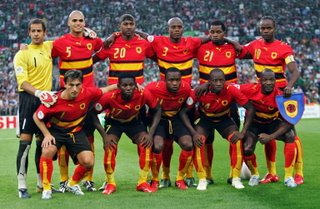 ANGOLA
ANGOLAGreater Goal: Healing a War-Torn Land
By Henning Mankell
The first time I visited Angola I was not aware that I was in that country. It was 1987 and I was living in the northwestern corner of Zambia, near the Angolan border. Narrow sand roads twisted through the endless bush. It was easy to get stuck while driving, and I often lost my bearings on my way to some distant village. When I'd stop to ask for directions, if the person I spoke to answered in Portuguese then it was imperative to get back to the right side of the invisible border quickly. Angola, so deeply wounded by its long colonial period, was throttled after liberation from Portugal by a violent civil war. The rebel leader Jonas Savimbi's warriors, infamous for indiscriminate violence, were everywhere. A generation of Angolans did not know what it was to live in a country where peace reigned.
But there was also something magical about that land beyond the invisible border: Soccer was everywhere. On gravel pitches and sandy beaches, on sidewalks and city squares, the ball was played back and forth between hordes of young men. The balls were made of the most remarkable materials, an old T-shirt or fishing net or woman's handbag filled up with paper and grass. But they rolled and bounced, and you could do headers with them and make goals with them. War could never kill soccer in Angola. The soccer fields were demilitarized zones, and the face-off between teams conducting an intense yet essentially friendly battle served as a defense against the horrors that raged all around. It is harder for people who play soccer together to go out and kill each other.
Angola has seen many of its soccer players leave the country to seek their livelihood, mostly in Portugal. But they have not given up their citizenship. And when they are called home to put on black shorts and red socks and jerseys, their national team colors, they do not hesitate. They are known fondly as Palancas Negras, the "black antelopes."
On the eighth of October 2005, Angola arrives at Amahoro Stadium in Kigali. At that moment the astonishing situation is that if Angola can beat Rwanda by even a single goal, it will qualify for the World Cup ahead of Nigeria—no matter what happens in Nigeria's game against Zimbabwe. It is a nightmarish wait for all the Angolans who sit with their ears glued to radios. Luanda stands still, Huambo, Lubango, Namibe, Lobito, Benguela, Malanje, every city, every village is gathered at radios. Perhaps even the antelopes themselves stand out on the savanna with pricked ears.
When the first half ends, the score is tied at zero. Meanwhile, Nigeria is on its way to victory over Zimbabwe. But in Kigali the game continues without a goal. It all seems to be ending badly for Angola. One wonders what the players and coaches said to each other at the half. Nervousness spreads among the players. Rwanda, playing only for its honor, comes close to scoring on several occasions. Everyone agrees that Angola is playing miserably. It is a team at the edge of a breakdown, missing passes and misunderstanding each other. There are ten minutes left. The Angolans are almost unconscious in their desperation. Then the last-minute replacement Zé Kalanga makes a cross pass that is as surprising as it is brilliant. Fabrice "Akwa" Maieco is in the right place. With a header he perfectly launches the game's only goal, past Rwanda's goalie, one bounce on the ground, and then the ball flies up into the net.
A person would have to live for a long time in Africa to understand what this victory means. Of course no one imagines today that Angola will get very far in the tournament. But it is in the very nature of soccer to be unpredictable. If it were not the case that underdogs can sometimes defeat the predicted winners, soccer would be uninteresting.
But a great victory has already been won. It brought no gleaming cup. This triumph exists first of all in the hearts and minds of the Angolan people. To go to the finals of the World Cup in soccer means an enormous amount to the self-confidence of a country that has been ravaged by war and deprivation. A country, battered for so long, will be built up again.
(Henning Mankell is the author of some 40 novels, including crime novels featuring inspector Kurt Wallander. He divides his time between Sweden and Mozambique, where he directs Teatro Avenida.)
No comments:
Post a Comment